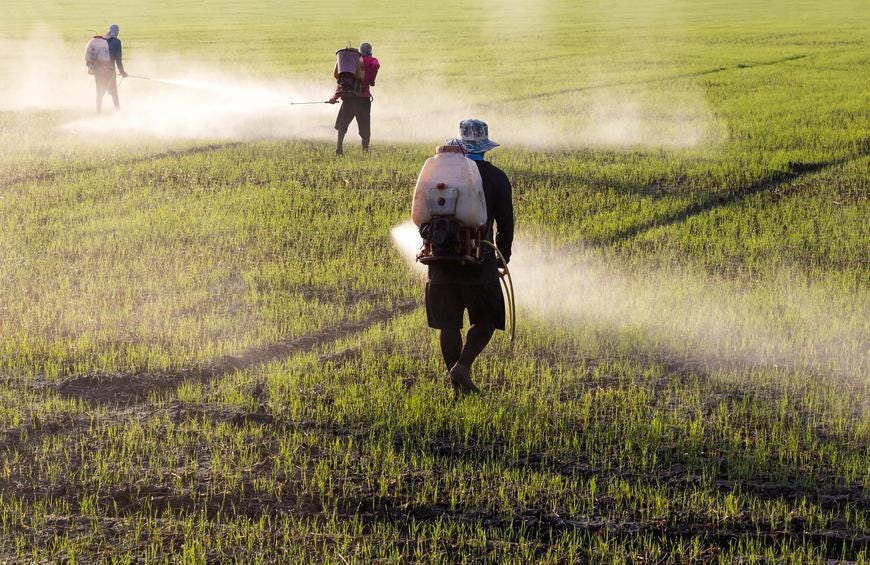☣️ The hidden cost of agrochemicals
Health: In June of 2020, Bayer AG, the pharmaceutical and life sciences company that owns Monsanto, agreed to pay $10 billion to settle more than 9,000 class-action lawsuits to those who rightfully claimed that its signature herbicide, Roundup, was responsible for their cancer diagnosis. At the same time, the company shelled out $400 million to farmers whose crops and orchards were decimated by dicamba, an active chemical in Bayer’s XtendiMax herbicide, which drifted onto their fields. This verdict came after a number of conservation groups filed an emergency motion to reverse the Environmental Protection Agency’s (EPA) approval of dicamba for agricultural use.
If you thought this was the end of Bayer and Monsanto’s reign over farmers, think again. In the aftermath of these lawsuits, the agrochemical giant is forging ahead with a new variety of genetically-engineered (GE) corn, MON 87429. The crop is resistant to 5 herbicides at once - including dicamba, 2, 4-D, glyphosate, and more. In contrast to the company’s stated goal, the use of herbicide-resistant crops has only increased the volume of herbicides applied to US cropland. If the USDA approves MON 87429, it will further perpetuate a food production system that locks growers into a chemical-dependent model of farming.
Want to make your voice heard? Sign the petition to ban glyphosate, the most widely applied pesticide worldwide. A 2018 study found glyphosate residue in every sample of popular oat-based cereal marketed specifically to children. Exposure to the weed killer has been shown to degrade soil and increase the risk of cancer, infertility, and respiratory illness in humans.
Watch: You may be surprised to learn that In the US, farmers have the highest suicide rate of any profession. Regeneration: The Beginning explores this crisis while exposing the human and environmental impacts of chemical farming. The first part of this docu-series follows the Breitkeutz family, a fourth-generation family running Stoney Creek Farm, as they transition from conventional practices - e.g. tilling the soil and spraying crops with herbicides - to more regenerative methods, which focus on improving the water cycle and increasing biodiversity. The series was produced by Farmer’s Footprint, a coalition of farmers, educators, doctors, scientists, and business leaders aiming to regenerate five million acres of farmland by 2025.
Snack: Looking for a guilt-free snack to satisfy your sweet tooth? Alter Eco is a premium chocolate company pioneering a full circle approach to eating, farming, and doing business. The team sources 100% of its ingredients from small-scale farmers and dairies that practice dynamic agroforestry, a method of agriculture that mimics the natural evolution of a forest. In partnership with the Acopagro Coop, Alter Eco is building a carbon-neutral supply chain that regenerates soil, boosts nutrient density, and provides financial security for farmers.
Thanks for listening to us! Don’t forget to share this week’s harvest with your friends.
The Regeneration is brought to you by PastureMap | Soilworks | Wholesome Meats.


